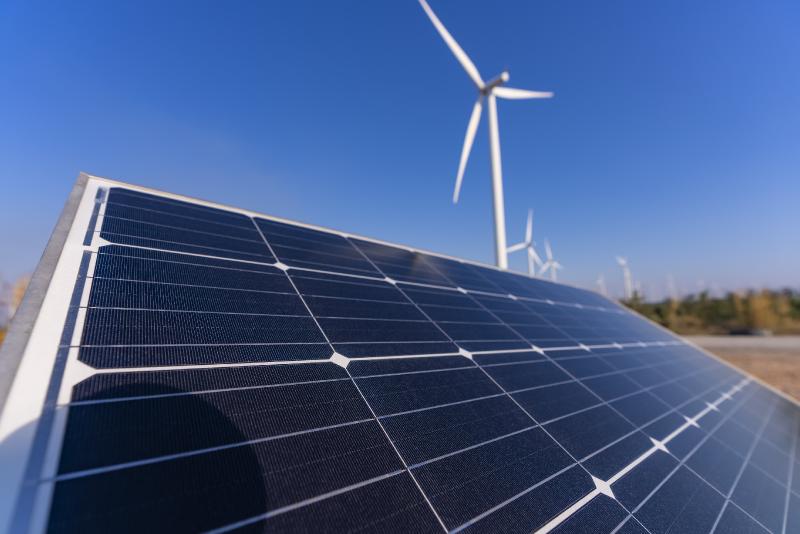'Basel III' bank rules could pose unexpected threat to Biden's green energy plans
By: Emily Wilkins (CNBC)


First I've heard of this. But the news isn't surprising. Banks have been subsidized and bailed out by taxpayers since Bill Clinton approved the repeal of Glass-Steagall. (That's supposedly one of Joe Biden's biggest regrets. Hey, Joe, that vote is gonna bite you on the ass.)

WASHINGTON, D.C. - On a rooftop overlooking Gallaudet University in Washington, D.C., Julian Torres stands next to row after row of solar panels his company, Scale Microgrids, helped install as part of a larger system of renewable energy that has saved the college about $1 million per year in utility costs.
Torres, the company's chief investment officer, is among many people and institutions worried that such projects will be nearly impossible in the coming years due to a planned change in banking regulations.
The plan, part of an international agreement widely known as "Basel III endgame," is meant to prevent a global financial crisis by increasing the amount of capital that banks must hold for certain investments to cushion them against potential losses.
Torres said the proposed rule "potentially makes projects unfinanceable with the implied costs" and that he's already heard from bankers who have said they won't be able to continue funding renewable energy projects like the ones Scale Microgrids designed and installed at Gallaudet.
Major banks, renewable energy companies, environmental groups and more than 100 lawmakers have also expressed concerns about the proposed framework for the change being prepared by the Federal Reserve, the FDIC and the Office of the Comptroller of the Currency.
Banks help fund the vast majority of renewable energy projects through tax equity investments, which allow the banks to benefit from federal tax credits for renewable energy. Currently, renewable energy draws $18 billion to $20 billion annually through tax equity investments, according to the American Council on Renewable Energy. Spurred by tax credit demand, that market is expected to more than double to $50 billion within the next few years.
However, the amount of capital that banks would need to fund renewable energy projects through tax equity investments would quadruple under the proposed framework.
That could result in annual tax equity investments in the renewable energy sector declining as much as 90%, according to policy analysis firm Capstone.
"Many people joke that we're on the 'solar-coaster,'" Torres said about the ups and downs of renewable energy. "But this is probably the biggest challenge we face right now."
Federal Reserve Chair Jerome Powell told lawmakers that "broad and material changes" are needed to the proposed framework and that he was "aware of the commentary" around the impact to green energy.
The higher capital requirements for renewable energy projects in Basel III puts the regulation on a collision course with the Biden administration's push for cleaner and greener energy sources. Biden championed a 2022 law that included an expansion of tax credits for clean energy.
Dominic Lacy, Gallaudet's chief operating officer, said the university needed to replace its aging infrastructure and decided to switch to more renewable energy sources. The final system includes Tesla batteries, solar panels and engines that can run on renewable natural gas if that becomes a viable option in the future.
"If we didn't have access to that tax credit, we would have had to figure out a different way to replace the infrastructure; it would have been incredibly difficult," he said. "Quite frankly, I don't know that we would have been able to replace our energy at the scale at which we did."
The financial regulators overseeing the framework received more than 200 comments on the 1,087-page proposal.
In a joint letter, the American Bankers Association, which represents the largest banks, and the Bank Policy Institute warned that renewable energy projects would be "uneconomic" under the proposed rule's new capital requirements.
The Clean Energy State Alliance, a bipartisan coalition of state energy agencies, also wrote to the regulators with concerns about a higher capital requirement, saying they saw little reason those investments would need to be weighed as riskier than they currently are.
"The clean energy industry's experience with tax equity investments does not warrant such a radical change," the group's letter read. "We urge you to consider the impacts of such a rule on state and national climate goals as well as the economic impacts of slowing down the clean energy transition."
Rep. Sean Casten, D-Ill., led 106 Democrats in a letter asking the agencies to "reconsider this change in the proposed rule and consider alternatives that accurately reflect the risk profiles of tax equity investments."
The financial regulators are expected to take comments into consideration and release a final framework later this year.








Any bank regulation is an existential threat to the political priority of the moment. Civilization collapses if banks are not allowed to make risky gambles underwritten by taxpayers. We'll return to the stone age if we don't allow finance to skim and scam it's unearned share.
Thanks, Bill Clinton. (Yeah, Joe Biden did his part to build that, too.)
Will climate change finally kill the Federal money tree? Biden will undoubtedly interpret this threat to energy transition as a need for bigger subsidies. But don't worry, Biden has promised no tax increases. But doesn't inflation act like a tax?